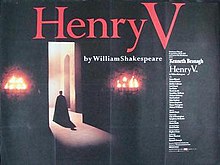Henry V (1989 film)
| Henry V | |
|---|---|

Theatrical release poster
|
|
| Directed by | Kenneth Branagh |
| Produced by | Bruce Sharman |
| Screenplay by | Kenneth Branagh |
| Based on |
Henry V by William Shakespeare |
| Starring |
|
| Narrated by | Derek Jacobi |
| Music by | Patrick Doyle |
| Cinematography | Kenneth MacMillan |
| Edited by | Michael Bradsell |
|
Production
company |
BBC Films
Renaissance Films |
| Distributed by |
The Samuel Goldwyn Company (USA) Curzon Film Distributors (UK) |
|
Release date
|
|
|
Running time
|
137 minutes |
| Country | United Kingdom |
| Language | English French |
| Budget | $9 million |
| Box office | $10.2 million |
| Henry V | |
|---|---|
| Soundtrack album by Patrick Doyle | |
| Released | 8 November 1989 |
| Recorded | 1989 |
| Genre | Soundtrack |
| Length | 59:08 |
| Label | EMI Records |
| Professional ratings | |
|---|---|
| Review scores | |
| Source | Rating |
| AllMusic |
|
| Filmtracks |
|
Henry V is a 1989 British historical drama film adapted for the screen and directed by Kenneth Branagh, based on William Shakespeare's play of the same name about King Henry V of England. The film stars Branagh in the title role with Paul Scofield, Derek Jacobi, Ian Holm, Emma Thompson, Alec McCowen, Judi Dench, Robbie Coltrane, Brian Blessed, and Christian Bale in supporting roles.
The film received worldwide critical acclaim and has been widely considered one of the best Shakespeare film adaptations ever made. For her work on the film, Phyllis Dalton won an Academy Award for Best Costume Design and Kenneth Branagh, in his directorial debut, received Oscar nominations for Best Actor and Best Director.
The film begins with Chorus, in this case a person in modern dress, introducing the subject of the play. He is walking through an empty film studio and ends his monologue by opening the doors to begin the main action. Chorus reappears several times during the film, his speeches helping to explain and progress the action.
The following act divisions reflect the original play, not the film.
Early 15th century in England: The Bishop of Ely and the Archbishop of Canterbury collude to distract young King Henry V from passing a decree that might confiscate property from the church. They agree to talk him into invading France. Canterbury appears in the throne room and explains to the King's advisers that Henry is rightful heir to the throne of France on the grounds that the Salic law in France unjustly bars his claim to the throne and should be disregarded. Supported by the noblemen Exeter and Westmoreland, the clergymen manage to persuade Henry to declare war on France if his claim on the French crown is denied.
...
Wikipedia
